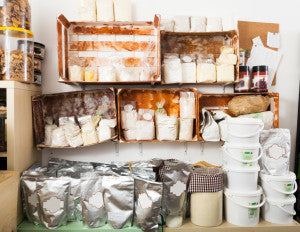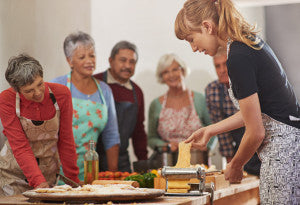By Beth Buck

If you are reading this article, there's a high probability that you're something of an emergency preparedness enthusiast. You've reviewed FEMA statistics about natural disasters. If you don't have a 72-hour kit and several buckets of wheat in your basement, it's because you're still putting it all together or you're waiting on your shipment to arrive. In other words, if you are reading this article, you either have all your ducks in a row or you're working towards getting them a row.
And good for you! If everyone had something as basic as a 72-hour kit, everyone would be a lot better off. And yet, the sad fact of emergency preparedness is that not everyone prepares. Every time a natural disaster strikes the United States, horror stories pour in about folks left with no food or water for three days, lying feverish and shivering on rooftops, and worse. Despite all the evidence to suggest that basic, common-sense disaster preparedness is a good idea, statistics and on-the-ground, real-life evidence suggests hardly anyone prepares.
I've heard many people laugh it off, proclaiming, “I don't need to have my own food storage. When the zombie apocalypse comes, I'll just head to my Aunt's house.” I've even had people tell
me with a chuckle that they're coming over to my place if civilization collapses.
A lot of people with emergency supplies are uncomfortable with the idea that the unprepared could knock on their door asking for handouts during a crisis. It suggests that the unprepared are somehow entitled to the supplies you've diligently squirreled away over the years. While some families make it a point to amass supplies specifically for neighbors and family members in the event of a natural disaster, it's not feasible for the majority to do so. Even the most self-reliant people have just enough resources to sustain their own families. Only a very small minority have the ability to prep for people who do not reside within their households.
This doesn't make us preparedness-minded folks stingy or mean when we express unwillingness to share, it just means we can do math. If Aunt Pearl has enough food storage for a month, and then three families show up at her doorstep because they know she's the family Emergency Preparedness Lady, suddenly that month of food only lasts a week. And that's fine if the grocery stores will be up and running within three days. But what if it's longer?
[caption id="attachment_22072" align="alignright" width="300"]

Teach your family and neighbors how to be ready for emergencies. This may include teaching them to cook using their long-term food storage.[/caption]
Yet emergency preparedness folks are fundamentally charitable people and want to help out their neighbors and family members. I submit that the most effective way to care for others during a crisis is to encourage them to
also have their own preps. It's worth pointing out that this is also FEMA's model, encouraging people to prepare on an individual basis, rather than relying solely on government funding or other top-town programs.
For example, you can give the gift of food storage. Food storage makes a wonderful – if singularly unromantic – gift for graduations or weddings. My father-in-law genuinely gave us 72-hour kits when my husband and I married. Those two kits and a couple of ratty towels are some of the few things we still have from our 2005 wedding. A year or two ago our big Christmas gift from my parents was – da dum! – a bucket of oat groats. And nothing says, “you're my favorite daughter,” like a case of freeze-dried hamburger.
Talk to your friends and family members about what you've learned about emergency preparedness. If they have questions, answer them. Share your struggles so others won't make the same mistakes (on an unrelated note, always,
always rotate your food storage.)
Teach skills. I've had friends over to my house for bread making, canning, and sewing. These are enjoyable activities to share with friends.
If you'd like to be on the receiving end of all this, make friends with emergency-preparedness types. We are a great bunch and love geeking out about wheat buckets, water filters, and portable stoves. Ask us what you need in your 72-hour kit and we will be extremely pleased to tell you all about it, if you have a couple of hours.
 Beth Buck has been involved with emergency preparedness since her very earliest years. She enjoys hiking, martial arts, reading, and writing about food storage. Beth lives in the Intermountain West with her family.
Beth Buck has been involved with emergency preparedness since her very earliest years. She enjoys hiking, martial arts, reading, and writing about food storage. Beth lives in the Intermountain West with her family.

 If you are reading this article, there's a high probability that you're something of an emergency preparedness enthusiast. You've reviewed FEMA statistics about natural disasters. If you don't have a 72-hour kit and several buckets of wheat in your basement, it's because you're still putting it all together or you're waiting on your shipment to arrive. In other words, if you are reading this article, you either have all your ducks in a row or you're working towards getting them a row.
And good for you! If everyone had something as basic as a 72-hour kit, everyone would be a lot better off. And yet, the sad fact of emergency preparedness is that not everyone prepares. Every time a natural disaster strikes the United States, horror stories pour in about folks left with no food or water for three days, lying feverish and shivering on rooftops, and worse. Despite all the evidence to suggest that basic, common-sense disaster preparedness is a good idea, statistics and on-the-ground, real-life evidence suggests hardly anyone prepares.
I've heard many people laugh it off, proclaiming, “I don't need to have my own food storage. When the zombie apocalypse comes, I'll just head to my Aunt's house.” I've even had people tell me with a chuckle that they're coming over to my place if civilization collapses.
A lot of people with emergency supplies are uncomfortable with the idea that the unprepared could knock on their door asking for handouts during a crisis. It suggests that the unprepared are somehow entitled to the supplies you've diligently squirreled away over the years. While some families make it a point to amass supplies specifically for neighbors and family members in the event of a natural disaster, it's not feasible for the majority to do so. Even the most self-reliant people have just enough resources to sustain their own families. Only a very small minority have the ability to prep for people who do not reside within their households.
This doesn't make us preparedness-minded folks stingy or mean when we express unwillingness to share, it just means we can do math. If Aunt Pearl has enough food storage for a month, and then three families show up at her doorstep because they know she's the family Emergency Preparedness Lady, suddenly that month of food only lasts a week. And that's fine if the grocery stores will be up and running within three days. But what if it's longer?
[caption id="attachment_22072" align="alignright" width="300"]
If you are reading this article, there's a high probability that you're something of an emergency preparedness enthusiast. You've reviewed FEMA statistics about natural disasters. If you don't have a 72-hour kit and several buckets of wheat in your basement, it's because you're still putting it all together or you're waiting on your shipment to arrive. In other words, if you are reading this article, you either have all your ducks in a row or you're working towards getting them a row.
And good for you! If everyone had something as basic as a 72-hour kit, everyone would be a lot better off. And yet, the sad fact of emergency preparedness is that not everyone prepares. Every time a natural disaster strikes the United States, horror stories pour in about folks left with no food or water for three days, lying feverish and shivering on rooftops, and worse. Despite all the evidence to suggest that basic, common-sense disaster preparedness is a good idea, statistics and on-the-ground, real-life evidence suggests hardly anyone prepares.
I've heard many people laugh it off, proclaiming, “I don't need to have my own food storage. When the zombie apocalypse comes, I'll just head to my Aunt's house.” I've even had people tell me with a chuckle that they're coming over to my place if civilization collapses.
A lot of people with emergency supplies are uncomfortable with the idea that the unprepared could knock on their door asking for handouts during a crisis. It suggests that the unprepared are somehow entitled to the supplies you've diligently squirreled away over the years. While some families make it a point to amass supplies specifically for neighbors and family members in the event of a natural disaster, it's not feasible for the majority to do so. Even the most self-reliant people have just enough resources to sustain their own families. Only a very small minority have the ability to prep for people who do not reside within their households.
This doesn't make us preparedness-minded folks stingy or mean when we express unwillingness to share, it just means we can do math. If Aunt Pearl has enough food storage for a month, and then three families show up at her doorstep because they know she's the family Emergency Preparedness Lady, suddenly that month of food only lasts a week. And that's fine if the grocery stores will be up and running within three days. But what if it's longer?
[caption id="attachment_22072" align="alignright" width="300"] Teach your family and neighbors how to be ready for emergencies. This may include teaching them to cook using their long-term food storage.[/caption]
Yet emergency preparedness folks are fundamentally charitable people and want to help out their neighbors and family members. I submit that the most effective way to care for others during a crisis is to encourage them to also have their own preps. It's worth pointing out that this is also FEMA's model, encouraging people to prepare on an individual basis, rather than relying solely on government funding or other top-town programs.
For example, you can give the gift of food storage. Food storage makes a wonderful – if singularly unromantic – gift for graduations or weddings. My father-in-law genuinely gave us 72-hour kits when my husband and I married. Those two kits and a couple of ratty towels are some of the few things we still have from our 2005 wedding. A year or two ago our big Christmas gift from my parents was – da dum! – a bucket of oat groats. And nothing says, “you're my favorite daughter,” like a case of freeze-dried hamburger.
Talk to your friends and family members about what you've learned about emergency preparedness. If they have questions, answer them. Share your struggles so others won't make the same mistakes (on an unrelated note, always, always rotate your food storage.)
Teach skills. I've had friends over to my house for bread making, canning, and sewing. These are enjoyable activities to share with friends.
If you'd like to be on the receiving end of all this, make friends with emergency-preparedness types. We are a great bunch and love geeking out about wheat buckets, water filters, and portable stoves. Ask us what you need in your 72-hour kit and we will be extremely pleased to tell you all about it, if you have a couple of hours.
Teach your family and neighbors how to be ready for emergencies. This may include teaching them to cook using their long-term food storage.[/caption]
Yet emergency preparedness folks are fundamentally charitable people and want to help out their neighbors and family members. I submit that the most effective way to care for others during a crisis is to encourage them to also have their own preps. It's worth pointing out that this is also FEMA's model, encouraging people to prepare on an individual basis, rather than relying solely on government funding or other top-town programs.
For example, you can give the gift of food storage. Food storage makes a wonderful – if singularly unromantic – gift for graduations or weddings. My father-in-law genuinely gave us 72-hour kits when my husband and I married. Those two kits and a couple of ratty towels are some of the few things we still have from our 2005 wedding. A year or two ago our big Christmas gift from my parents was – da dum! – a bucket of oat groats. And nothing says, “you're my favorite daughter,” like a case of freeze-dried hamburger.
Talk to your friends and family members about what you've learned about emergency preparedness. If they have questions, answer them. Share your struggles so others won't make the same mistakes (on an unrelated note, always, always rotate your food storage.)
Teach skills. I've had friends over to my house for bread making, canning, and sewing. These are enjoyable activities to share with friends.
If you'd like to be on the receiving end of all this, make friends with emergency-preparedness types. We are a great bunch and love geeking out about wheat buckets, water filters, and portable stoves. Ask us what you need in your 72-hour kit and we will be extremely pleased to tell you all about it, if you have a couple of hours.
 Beth Buck has been involved with emergency preparedness since her very earliest years. She enjoys hiking, martial arts, reading, and writing about food storage. Beth lives in the Intermountain West with her family.
Beth Buck has been involved with emergency preparedness since her very earliest years. She enjoys hiking, martial arts, reading, and writing about food storage. Beth lives in the Intermountain West with her family.



1 comment
Kirsten Reynolds
Hello Beth! I’m located in Anchorage, AK ! I read your auricles and love what you write on being prepared for disasters. I’m heading up a class and needing a curriculum to teach others on how to do the same. Where would you recommend me to look ? Do you have a curriculum ? I know it must sound funny that someone living in Alaska is teaching folks how to survive a disaster. But majority of my audience are from the city. Thank you ahead of time for any and all info. It helps a lot !